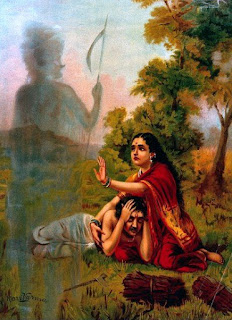There was once a very rich man who lived a very lonely life.
From the outside looking in, he appeared to have it all. He had a nice house,
fancy cars, and a successful career. However, he had no family to share all of
his treasures with. Because of this, he felt very poor. He decided that he
would know no greater joy than to share his possessions, but with whom?
He sat on a busy street, and dressed himself in rags. Men
and women in business suits passed by and scoffed at him. “Get up and find a
job,” they’d say. Other people who passed him ignored him altogether, he felt
as if he was invisible. He peered across the street, and could see through a
window of a small apartment. A mother was packing lunches, and appeared to be
using the last of her loaf of bread. She cut the last slice of bread in half,
and gave one to each of her two children. He noticed a single tear fall down
the mother’s cheek as she hugged her children goodbye for the day. The kids
kissed their mother, and cheerfully sped out the door to walk to school.
The children walked past the rich man dressed as a beggar
and stopped. “What are you doing out here, sir? It’s cold and rainy!” The man
replied, “I have fallen on some hard times and have nowhere else to go. I am
hungry and lonely, and thought I would sit here and beg for someone to help me.”
One of the children replied, “We can help you!” and handed the man her lunch,
which was comprised of only a half-slice of bread. The other child followed
suit, and wished the man well. Tears welled in the man’s eyes. Never had anyone
moved him so greatly.
After the kids hurried off to school, the man walked over to
their apartment. Their mother greeted him at the door, and he explained the
situation that had occurred with her children. He then reached for his
checkbook, filled out a check, tore it out, and handed it to the mother. The
mother took the check and stared for a long while. She then stared at the man,
and then back and forth between the man and the check. After a few moments of
this, the woman fainted.
The rich man indeed felt rich that day, although his bank
account had decreased by about 90%. He of course, helped revive the woman, and
they went on to become dear friends.
Toast-1,
Author: Rainer Zenz, Date: Not listed, Source:
Wikimedia
Author's Note:
In this week's portion of my reading, a mongoose appears and tells a story to Yudhishthira and his kingdom. In his story, he witnesses a very poor family who shares the very last of their food with a traveler. Ultimately, after the family blesses the traveler, the mongoose witnesses the family be escorted up to a heavenly place in a beautiful chariot. I essentially re-told what the mongoose witnessed in a different way. In this version, the poor family receives a large amount of money in the end, and the story takes place in a more modern setting.
Bibliography:
Mahabharta retold by William Buck and illustrated by Shirley Triest, 1973. Print.




























